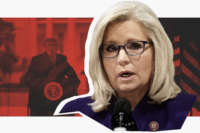
Rep. Liz Cheney (R-Wyoming), vice chair of the House select committee investigating the January 6 attack on the U.S. Capitol, has suggested that the commission could be looking at charging former President Donald Trump with potential crimes related to that day’s events.
In a committee hearing on Tuesday, Cheney read aloud a number of text exchanges between then-Chief of Staff Mark Meadows and conservative lawmakers and other prominent figures on the right as the Capitol building was being attacked. The communication records were shared to show why his testimony is needed ahead of a committee vote to hold Meadows in contempt of Congress; Meadows has refused to appear at additional closed-door depositions to discuss the messages and other evidence relating to the January 6 investigation.
Following the commission’s unanimous decision to hold Meadows in contempt, the matter now goes to a full vote within the House of Representatives. If affirmed by the House, it is then referred to the Department of Justice (DOJ), which will determine whether a criminal indictment against the former chief of staff should move forward.
The text messages Meadows had exchanged as the attack was ongoing were with Republican lawmakers, conservative media personalities, and even Trump’s eldest son, Donald Trump Jr. They showcase just how aware Trump and his allies were of the attack, and their willingness to admit in private that Trump Sr. could have taken steps to stop it.
“He’s got to condemn this shit ASAP,” Trump Jr. texted Meadows, urging him to advise Trump Sr. to respond to the attack on Congress by a mob of the former president’s own loyalists.
“I’m pushing it hard. I agree,” Meadows responded.
Trump Jr. wrote back, saying his father “has to lead now.”
“It has gone too far and gotten out of hand,” Trump Jr. said.
When Cheney finished reading these and other texts to and from Meadows, she explained their significance: “These texts leave no doubt: the White House knew exactly what was happening at the Capitol. Members of Congress, the press, and others wrote to Mark Meadows as the attack was underway.”
“These non-privileged texts are further evidence of President Trump’s supreme dereliction of duty during those 187 minutes,” Cheney added. “And Mr. Meadows’s testimony will bear on another key question before this committee: Did Donald Trump, through action or inaction, corruptly seek to obstruct or impede Congress’s proceedings?”
That last comment piqued the interest of many legal experts, who said that Cheney may have implied that the commission could seek to indict the former president somewhere down the line.
Harvard Law School professor emeritus Laurence Tribe, quoting Cheney’s question, noted that impeding Congress in the way that she described “is a serious federal crime,” citing federal statute 18 USC 1505. That law states that a person that “obstructs, or impedes or endeavors to influence, obstruct, or impede the due and proper administration” of a federal proceeding — such as the congressional certification of the Electoral College — can be fined or imprisoned for up to five years.
Other legal experts also commented on Cheney’s question during the proceedings.
“Interesting thing about tweets [Rep. Liz Cheney] read tonight is that GOP legislators/media folks took as gospel that Trump and Trump alone could call off the mob. They were his to command. Cheney raising the notion that by failing to stop them, Trump impeded Congress (could be a crime),” wrote former federal prosecutor Joyce Alene.
“The White House failing to heed the pleas of even close allies during a deadly attack on the Capitol is so much worse than Watergate,” said Kimberly Atkins, attorney and current senior opinion writer at The Boston Globe.
This post was originally published on Latest – Truthout.